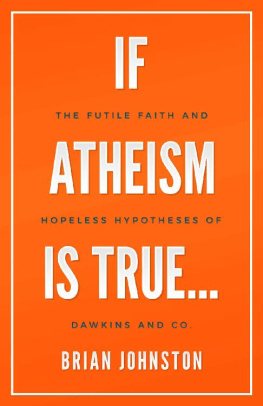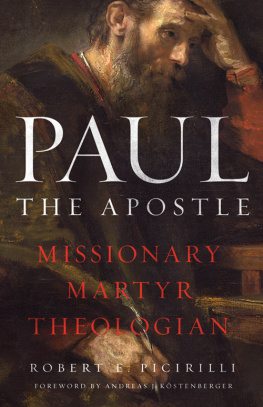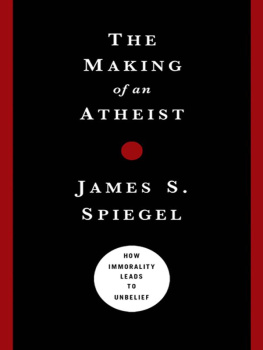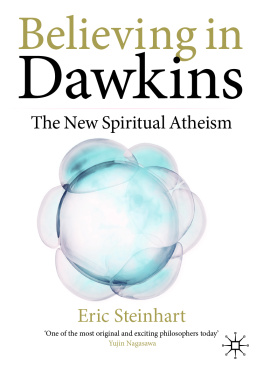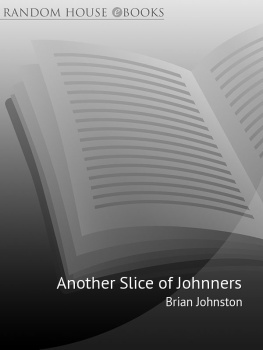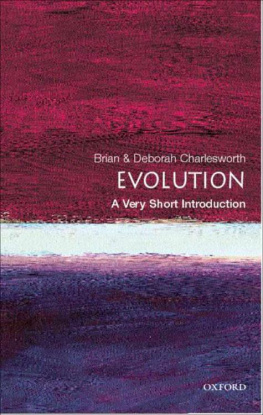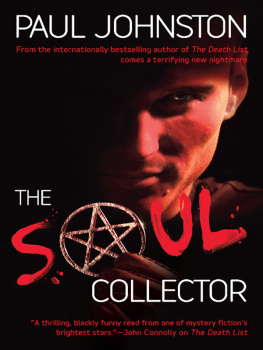CHAPTER ONE
INTRODUCTION
Theres a delightful little limerick by George Gamow (a Big Bang cosmologist), which goes like this:
There was a young fellow from Trinity
Who took the square root of infinity ( ).
But the number of digits
Gave him the fidgets;
So he dropped Maths and took up Divinity.
That interests me as I was pursuing a career in Mathematics when I had a distinct sense of God drawing me into a greater passion for still deeper truth, truth as it relates to the bigger philosophical questions, such as How may one satisfy oneself that God actually exists? and Does this hypothesis make better sense of life as we know it? As I write the introduction to this book, its the season of Advent. Increasingly, western society is set on demystifying the Christmas period, majoring on replacement terminology like Happy Holidays, indulging in mere sentimentalism, and prefers to hang idealist hype on a mere winters tale. I like to remind friends, however, that choosing this approach has serious consequences. For one must believe in either one virgin birth or the other and by the other virgin birth I mean the view that the universe exploded into being all by itself. Somehow, inexplicably, from a state of non-being, it - something that was non-existent - exploded!
You can see how nonsensical that is, for if there was ever once truly and absolutely nothing, there could not now be a something at least not without God (but that hypothesis is discounted). So, heres the thing - standing where we are now, as hard as it may seem to believe in the existence of God, its even harder to believe in absolute nothing.
On the other hand, the child born to the virgin, the child who is Jesus Christ, was given a name that comes from the name by which God revealed himself to Moses: Yahweh (meaning I AM who I AM, Exodus 3:14). The name and nature of God is shown to be connected with the verb to be. God is the supreme being. But whats this saying? Simply this: God is the kind of being who cannot possibly not be. His existence is not dependent on anything outside of himself. Rather, everything outside of him depends on him for its existence. And so, hes the kind of being without whom nothing must evermore remain absolutely nothing.
The idea of things spontaneously generating themselves out of nothing has been well and truly scientifically debunked. Yet, somehow and quite irrationally the notion lingers on that if we replace the requirement of spontaneity with indeterminate vast quantities of time, then somehow its possible. The society which now considers itself too educated to believe in the story of the Child in the manger, can unthinkingly bring itself to believe instead in the fish in the bath-tub; that is, given enough time, a fish (or living chemicals) could develop by itself in some bath-tub (or warm pond).
Richard Lewontin, Professor of genetics, admits: We take the side of [evolutionary] science in spite of the patent absurdity of some of its constructs, in spite of its failure to fulfill many of its extravagant promises of health and life, in spite of the tolerance of the scientific community for unsubstantiated just-so stories, because we have a prior commitment, a commitment to materialism Moreover, that materialism is absolute, for we cannot allow a Divine Foot in the door (The New York Review, p. 31, 9 January 1997). Quite an admission. It will be our aim is this book to show this amounts to nothing other than the beliefs of those whom the Apostle Paul described as those who suppress the truth in unrighteousness (Romans 1:18). In the twenty-first century, there is absolutely no reason to be ashamed of the gospel (Romans 1:17) - far from it; no more intellectually satisfying position is possible.
However, in maintaining that view, we can expect to be challenged, even as we will find it unavoidable to do other than challenge the prevailing worldview. Always be prepared to make a defence to anyone who calls you to account for the hope that is in you (1 Peter 3:15). That was the Apostle Peters inspired advice geared towards helping thoughtful non-Christians. The word he uses for defending or making a defence is the word from which the term apologetics comes. Not that Christians have to apologize for their faith, but its our responsibility to always be ready to defend it. Nor should we think even for a moment that we can argue people into Gods kingdom. Not at all. While its necessary that we can defend our beliefs, any reasoned argument we can make will never be sufficient in itself. The power of logic cannot do what only the power of Gods Spirit can. But the Spirit of God can use us just as he used the Apostle Paul when he reasoned, explained, gave evidence and persuaded the crowds at Thessalonica (Acts 17:1-4).
But notice again with me the Apostle Peters words. He asks his fellow-believers to be prepared to give an answer; and if were to be prepared to give an answer to anyone who asks after the reason for the hope we have, then that must imply that our lives have already been drawing out questions from others our lives must have already been declaring the sure hope that we have in Christ. The fact that we have such a living hope should make our lifestyle choices distinct from people around us, and that in turn should stimulate discussion. We need to be prepared for that discussion.
Weve to be prepared to give an answer literally, an apologetic answer, by which we mean an answer that defends our faith. Apologetics is the term thats usually applied to the kind of pre-prepared answer we might give to questions or statements like those well be looking at in this book. We need to be assured that theres a solid basis for what we believe in Gods Word, one which cannot be overturned. The Christian faith is a reasonable faith. God, graciously, has furnished us with evidence we can use. Another point from the Apostle Peter is that weve not to reflect back any malice coming to us from the questioner. Thats not the spirit of Christ, who did not revile those who reviled him. Were to give our answer with gentleness and respect. This will glorify God, and may be used by him to bring about conviction in the heart of even a foul-mouthed accuser!
Our approach in this book will be to debunk the chapter headings which follow from the supposition (as stated in the title on the books cover) that atheism is true. Any premise which leads logically to false conclusions is demonstrably false.
CHAPTER TWO
ATHEISM MAKES MORE SENSE THAN CHRISTIANITY
At Athens, the ancient centre of learning, Pauls reasoned case for Christianity caught the attention of some who belonged to various schools of philosophy. Some of them effectively wrote Paul off as a babbler. The actual word they used literally described Paul as a seed-picker. It seemed to picture someone gathering up seeds in order to scrape together a meal for himself, just as some desperate person today might sift through rubbish bins or garbage cans in order to find enough food to live on. Applied to Paul, they were sneeringly suggesting that here was a poorly educated person who travelled around picking up other peoples ideas and feeding on their opinions before trading in them as though they were his own. They couldnt have been more wrong. There are those who give a reasoned case for Christianity today and they get sneered at too. The sneering may raise a popular cheer, but the intellectual case for Christianity is stronger.
Consider, first, how, if atheism is true, then life is ultimately without purpose:
The Nobel prize-winning scientist Steven Weinberg, an outspoken atheist, writes: The more the universe seems comprehensible, the more it also seems pointless. But if there is no solace in the fruits of our research, there is at least some consolation in the research itself The effort to understand the universe is one of the very few things that lifts human life a little above the level of farce, and gives it some of the grace of tragedy (from

